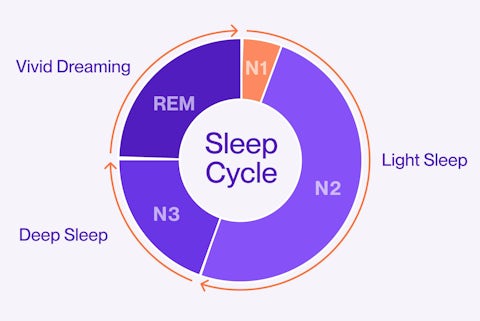How Long Can You Go Without Sleep?
 Andrew Jolie February 20, 2024 7 min read
Andrew Jolie February 20, 2024 7 min read
Today's world never stops. Sleep often takes a back seat. It makes you wonder: how long can we push our bodies without rest? You might be crunching for exams or trying to meet a work deadline. Or maybe you're binge-watching your favorite series. We've all been there. But what cost does our body pay for this borrowed time?
How Long Can a Human Stay Awake?
Humans are resilient, but there's a limit to how long we can stay awake. Staying up all night might seem like a feat. But, it pales next to Randy Gardner's 1964 record. He stayed awake for 11 days. However, this is far from recommended.
How Long Can You Live Without Sleep?
Living without sleep isn’t possible. The exact limit varies from person to person. But lack of sleep can harm your health after just 24 hours, and if it continues, it can cause lasting harm.
Side Effects of Not Sleeping
Certainly, let's take a more detailed look into the side effects of sleep deprivation:
- Lack of sleep can make you more emotionally volatile, leading to mood swings and increased irritability. This happens because lack of sleep affects the brain's ability to regulate emotions. It also makes it harder to cope with stress and annoyances.
- Your brain's cognitive functions suffer when you don't get enough sleep. These functions include focus, attention, and memory. This is because sleep is crucial. It helps merge memory, making memories stable. Sleep also helps keep us focused on tasks.
- A weakened immune system needs sleep. It is critical for fighting infections and inflammation. Without enough rest, your body produces fewer cytokines. Cytokines are proteins that target infection and inflammation and create an immune response. Without enough rest, you're more likely to catch colds, the flu, or other infections.
- Chronic sleep deprivation raises the risk of many serious health problems. These include heart disease, diabetes, and high blood pressure. This is because sleep loss harms the body's metabolism and heart function. It also hurts blood sugar regulation and raises inflammation and stress hormone levels.
- Lack of sleep can cause weight gain. It does this by causing hormone imbalances that affect appetite. Not sleeping makes the body produce more ghrelin. Ghrelin is a hormone that signals hunger. It also makes the body produce less leptin, a hormone that signals fullness. As a result, you may feel hungrier. You may also be more prone to overeating or indulging in high-calorie foods. Who knew?
The CDC published the following chart for recommended sleep according to age:
Source
How Many Days Can You Go Without Sleep Before Seeing Side Effects?
Lack of sleep can cause side effects. They can start after just one day of not resting and get worse the longer you go without sleep. At first, you may feel mood changes. These include irritability and increased stress. You may also notice a decreased ability to concentrate or remember details. As sleeplessness increases, these early symptoms can become more serious.
What happens if you don't sleep for a day / 24 hours?
Within the first 24 hours of no sleep, you may begin to feel the immediate consequences:
- Mood swings and irritability become more pronounced.
- Concentration and focus decrease.
- There's a noticeable increase in cravings for high-calorie foods.
What happens if you don't sleep for 36 hours?
Pushing past 36 hours without sleep, deeper cognitive and physical effects set in:
- Impaired decision-making abilities and problem-solving skills.
- Physical symptoms of tiredness intensify, making even basic tasks feel laborious.
What happens if you don't sleep for 2 days / 48 hours?
After 48 hours without rest, the absence of sleep compromises both mind and body:
- Memory lapses occur more, complicating the retention of new information.
- Muscle fatigue and dizziness show the body needs sleep now.
What happens if you don't sleep for 3 days?
Reaching the third day without sleep marks a critical point of sleep deprivation:
- Hallucinations may begin, blurring the lines between reality and imagination.
- Feelings of paranoia can emerge, driven by severe cognitive and emotional strain.
What Happens If You Don't Sleep for a Week or More Than a Week?
Going without sleep for a week or more brings about severe consequences. They may be irreversible.
- Psychological health can deteriorate, leading to profound disorientation and mood disturbances.
- The risk for serious health issues like heart disease and diabetes rises a lot. It also harms the immune system.
The body can endure short periods without sleep. But, the combined effects become serious. Recognizing the need for enough rest is not about avoiding tiredness. It's about protecting your health, safety, and well-being. You can get enough sleep by changing your lifestyle. You can also get advice or use aids like the Bía Smart Sleep Mask. This is crucial for a good night's rest.
What to Do If I Can’t Sleep?
If you’re having trouble sleeping, try making a soothing pre-bedtime routine. Also, make a more inviting sleep environment. Bía offers a specialized Smart Sleep Mask. It provides an immediate and comfy way to relax. It does this through neural sounds and darkness, which will help promote sleep. Adding the Bía Smart Sleep Mask to your nightly routine could be your first step. It could help you reclaim those precious hours of rest.
When Is the Time to Ask for Medical Help?
Ask your doctor if you have ongoing sleeplessness. This is especially true if it affects your daily life. Professional guidance can help address underlying issues and recommend effective treatment plans.
FAQs about Staying Awake:
How Long Does the Average Person Stay Awake?
The average person can stay awake for 16-18 hours. Our internal circadian rhythm governs this span. It helps control sleepiness and wakefulness in the day. Exceeding this time frame usually causes the body to show signs of sleep deprivation.
Is Staying Up All Night Bad?
Yes, consistently staying up all night can be harmful. It disrupts the body's sleep-wake cycle. This causes thinking problems, mood changes, and higher risk for health conditions. Occasional all-nighters may not cause long-term damage. But, they should not become a regular practice.
What’s the Longest You Can Go Without Sleep?
As mentioned before, the longest recorded time a person has gone without sleep is 11 days. Randy Gardner achieved this in 1964. This extreme case demonstrated significant cognitive and physical impairments during the experiment. Being awake this long is unsafe. It can have dangerous health implications. So, don’t try this at home!
Is It Possible to Live Without Sleep?
No, it is not possible to live without sleep. Sleep is critical. It supports many functions, including thinking, emotion, and health. Prolonged sleep deprivation can lead to severe health complications and eventually be fatal.
How Long Without Sleep Is Harmful?
Harmful effects can appear after 24 hours without sleep. They include impaired judgment, mood changes, and decreased thinking. As wakefulness grows, these effects get worse. They can lead to big health risks. Consistent lack of adequate sleep over time is particularly detrimental to your health.
Will Your Body Eventually Force You to Sleep?
Yes, the body has ways to force sleep. This happens through a process called microsleeps. They are brief, uncontrollable episodes of sleep. If sleep deprivation continues, the body will need sleep. It will override the brain's attempts to stay awake. But this sleep may not restore and can still leave the body and mind functioning poorly.
Can You Survive on 2 Hours of Sleep a Night?
Surviving on 2 hours of sleep a night over an extended period is detrimental to health. Short-term survival is possible. But, such little rest can lead to severe cognitive problems. It causes unstable emotions and declining physical health. Over time, this sleep pattern can cause chronic health conditions. It can also greatly lower quality of life.


